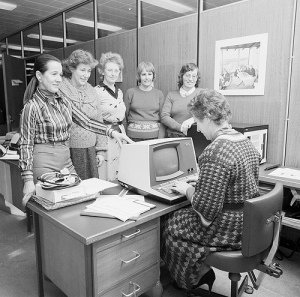 Yet again, the sound of magazine landing on mat has resulted in me posting on this blog. In fact, this will be three posts within a week, which brings new meaning to “prolific” and reminds me of the days – many years ago – when I was quite well known (in the blogosphere’s anonymous way) for a personal blog that achieved a degree of notoriety. And no, I won’t tell you how to find it.
Yet again, the sound of magazine landing on mat has resulted in me posting on this blog. In fact, this will be three posts within a week, which brings new meaning to “prolific” and reminds me of the days – many years ago – when I was quite well known (in the blogosphere’s anonymous way) for a personal blog that achieved a degree of notoriety. And no, I won’t tell you how to find it.
Anyway, FM World was the magazine in question, and the leader by Martin Read was the specific article that prompted a reaction. In a well-written piece, Martin bemoans the demise of the office of old; alive with the sound of hard-working salary slaves, and a thriving centre of social interaction. A place where we could all engage in a meeting of minds and a sharing of ideas, such that simply being alongside our colleagues would ensure that we achieved the very best that we could.
Martin’s view is that “technological trends are working against the priceless social cohesion that the office has traditionally provided”. He cites Instant Messaging, and the propensity for people to communicate electronically instead of face to face, for the disfunctional offices (my term, not Martin’s) that we find ourselves working in today, and concludes that “organisations should think really hard before committing to a future based upon flexible working”.
I can’t help feeling that Martin has missed the point here, because there’s no turning back the clock. Technology has revolutionised the way we work and will continue to do so; the issue is no longer whether it’s a good thing, but more how we can harness it in a positive way, rather than simply using it because it’s there. And if this means that we continue to rethink where property fits within the corporate environment and culture, so much the better, because the costs of commercial property are such that any increase in occupational efficiency can only be a good thing.
Now, I’m not for one moment suggesting that the days of the office are dead; on the contrary, a physical focal point for a corporate entity, and a hub for activity that requires interaction with others will always be required. But providing accommodation for all when many people can work more efficiently elsewhere is nonsensical. Indeed, the time and cost of traveling alone can mean that the traditional working day is inherently inefficient.
Where technology is implemented in the workplace, it has to be for the right reasons. In other words, we should be utilising technology because it makes us better at what we do, or at least more efficient in the way that we do it. And where technology is introduced, it has to go hand in hand with guidance and instruction on the manner in which it’s to be utilised. Indeed, it needs more than just instruction, because technology has brought about massive change in terms of organisational culture. To get it right, we need collaboration that involves not only an organisations leaders but also IT, HR and FM; all have a part to play in determining what a business needs; how those needs are going to be addressed; and how the resultant change needs to be managed.
Getting this right opens the door for effective flexible working. This might mean that people are no longer required to sit at a desk every day of every week, but if that’s the case it should be because a better alternative has been provided. And there are countless other types of efficiency that can also be realised, from video-conferencing instead of traveling the length and breadth of the country to removing the contraints of a corporate IT network whilst still enabling access to files and documents. In other words, escaping the physical constraints of the traditional working environment.
Perhaps we’re still learning what this means, and how we might best harness the power of technology without becoming it’s slave. However, the old days are gone, and I for one say “good riddance”. How can anyone not be excited about the future?
